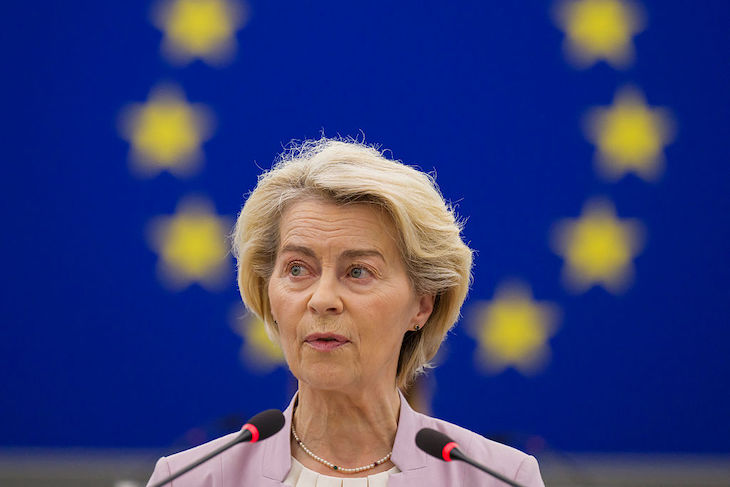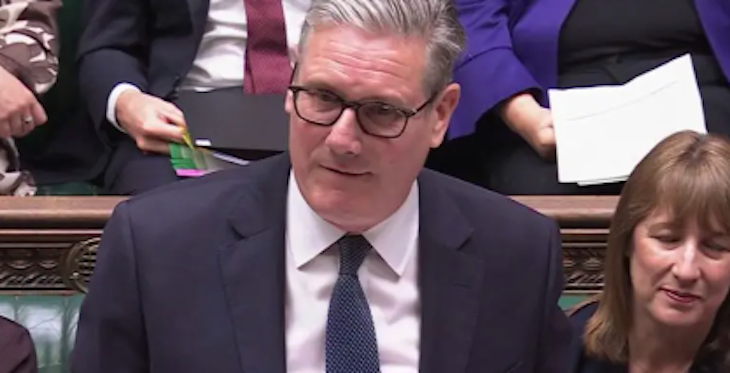Ursula von der Leyen faces the biggest test of her European Commission leadership as MEPs gather to vote on a motion of no-confidence. Today’s vote, the first of its kind in 11 years, has been brought by right-wing MEPs in relation to von der Leyen’s secretive negotiations with a pharmaceuticals boss during the pandemic. But while the European Commission president has tried to spin the no-confidence motion in her as ‘fuelled by conspiracy theorists’ – and seems set to win the vote – make no mistake: her leadership is badly damaged by this debacle, perhaps irreparably so.
Economically, militarily and diplomatically, the bloc is floundering
The chief complaint against von der Leyen is her alleged ‘failure to ensure transparency’ about a lawsuit initially filed by the New York Times. The newspaper was denied a request for records of text messages between the commission president and Dr. Albert Bourla, Pfizer’s chief executive, as she sought to secure a multibillion deal for coronavirus vaccines.
Von der Leyen denies any wrongdoing in what has been dubbed ‘Pfizergate’, and earlier this week the German dismissed the allegations as ‘simply a lie’. The Commission president told MEPs in Strasbourg on Monday that: ‘I was in contact with top representatives of the companies producing the vaccines that would get us out of the crisis’. But she rubbished the idea that she has anything to hide. ‘There were no secrets, no hidden clauses, no obligation to buy for member states,’ she said. The messages weren’t released to the public because they were too banal.
MEPs smelt a rat. One of them, Romanian Gheorghe Piperea, triggered the motion of no confidence that required the support of 71 of his peers. They believe that von der Leyen is guilty of a lack of transparency, but they have other reasons for wanting to see an end to her six-year reign.
Sarah Knafo, the European representative of Eric Zemmour’s Reconquest party, has explained that she will vote against von der Leyen because of her alleged ‘interference’ in recent elections in Romania and Germany. Knafo said there was also opposition to the EU’s Rearm initiative, which will spend €800 billion (£670 billion) in the coming years to boost Europe’s defence capabilities.
Knafo can count on the support on MEPs from Marine Le Pen’s National Rally. One of the most prominent is Fabrice Leggeri, who was head of the EU border agency Frontex before he won a seat in Strasbourg last year.
‘This vote is not simply a gesture of opposition, it is an act of responsibility,’ he declared. ‘It’s about saying that another path is possible, the return of politics, the return of the people, the return of reality’.
The vote has very little chance of succeeding: the two biggest political groups in Strasbourg, the centre-right European People’s Party and the centre-left Progressive Alliance of Socialists and Democrats will certainly swing into line behind their president. So will the Greens and the centrist Renew outfit.
Von der Leyen appears confident, bullishly brushing away the motion as ‘being taken right from the oldest playbook of extremists’.
Nonetheless, the vote is a sign of the growing unrest in the EU parliament at the leadership of von der Leyen. Economically, militarily and diplomatically, the bloc is floundering. It has an increasingly weak voice on the international stage, no matter how shrilly the likes of Emmanuel Macron and Friedrich Merz shout from the wings.
Few critics have been as vehement in their denunciation of von der Leyen over the years as Jordan Bardella, the president of the National Rally. In an address last month, he declared that his party ‘rejects the Europe of Ursula von der Leyen and Emmanuel Macron, preferring a Europe of nations’.
As of Wednesday morning, however, Bardella has some ‘transparency’ issues of his own, after police and magistrates raided the offices of his party and removed e-mails, documents and accounting records.
The raid happened in the same week that EU prosecutors launched an investigation into allegations that the National Rally and its European allies misused funds. A report in Le Monde said that they ‘are suspected of having improperly spent €4.3 million (£3.7 million) of European Parliament funds’. Bardella responded to the news by saying this was ‘a new harassment operation on the part of the European Parliament administration’.
The accusations are similar to the charges levelled at Marine Le Pen earlier this year. The leader of the National Rally and several other party members were convicted and she was disqualified from political life for five years. Although she has appealed, Le Pen has said that Bardella is the party’s Plan B for the 2027 presidential election. Might they now be required to produce a Plan C?
Wednesday’s raid is separate to the EU investigation. The Paris prosecutor’s office said that it is an enquiry that ‘an unnamed person opened last week following several reports from institutional sources’. It will examine how the National Rally funded their 2022 election campaign and whether ‘acts that may constitute fraud’ were committed by the party.
Bardella has denounced the raid as ‘spectacular and unprecedented’ and said that ‘no opposition party has ever suffered such harassment under the Fifth Republic’.
One of the National Rally’s senior figures, the MP Jean-Philippe Tanguy, wondered aloud at the timing of the raid. ‘As if by chance, in the week when Madame van der Leyen can be removed with a motion of censure on her scheming and fundamental dishonesty, they come up with some dodgy dossiers,’ he said.
What this week has proved is that the EU remains as dysfunctional as ever. In his speech in Westminster on Tuesday, French president Emmanuel Macron urged Britain not to ‘stay on the sidelines’ of Europe. But why would any country in their right mind seek closer ties to the EU when it is so dysfunctional and determined to tear itself apart?








Comments